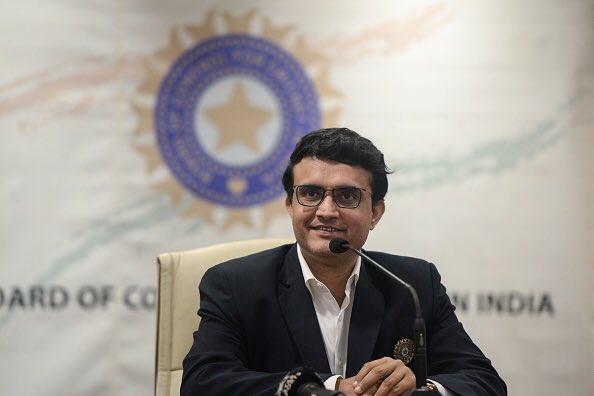Big Three to Big Five - The Rise of A New World Order
'I'll make him an offer he can't refuse' - Mario Puzo’s words, familiar to the world through Marlon Brando’s display, still resonate amongst fans all around the world and, more importantly, in BCCI’s actions.

The world’s richest board has always marched on its own orchestrated tune and it continues to do so. But the customs, the advertisements are now being executed via a whole new image. An image that separates world domination from the suppression of its underlings. In the same way as a King’s reign is separated from a dictatorship.
If not the King, then the master of puppets. Nothing explains N Srinivasan’s everlasting reign in Indian cricket better. I say everlasting because the intensity of his influence is so eminent that Srinivasan’s ideations still resonate amongst decisions taken by the newly-formed BCCI.
Way back in 2014, former BCCI president N. Srinivasan had thrown his idea of having a Big Three rule cricket into the hat. While the concept of India’s, rather the Big Three’s, domination didn’t amuse everyone, the ICC caused the restructuring process in the same year anyway. In the new structure formed then, under Srinivasan’s reign as the ICC chairman, the Big Three—India, Australia and England—would exercise more control over the game, and in repayment, seize the lion’s share of ICC’s revenue over an eight-year cycle starting 2015. By doing so, Srinivasan was not the first official in the world to put his national body above the world game, but he was by far the most successful financially.
But the current BCCI President, Sourav Ganguly, and Srinivasan are two distinct characters in the sport and in the world of administration. The fact that the two have adopted similar ways gets buried under the credibility that Ganguly carries with his personality. Several boards, including the top tier nations, are now more keen on establishing a stronger relationship with the BCCI with Ganguly’s face linked to the brand. The former captain, like any other strong-headed BCCI President, has set his goal into making the BCCI a force, under a Big Five model, that the ICC can’t overhaul.
With the interference of the Supreme Court in 2017, that brought about BCCI’s fall, the withdrawal of the board’s counterparts from the Big scheme was inevitable. Prior to that, the idea had been, "Better to have the BCCI in the tent, than having it pelt stones from outside” — according to Sambit Bal. But with the judiciary body taking over the operations and dismissal of BCCI’s chairman position, the concept of more restrictive and powerful world order was lost somewhere. However, with Ganguly taking charge BCCI’s compeers seem to be inclined towards the good old policy cloaked with a face of credibility.
For us, the commoners, it is rather difficult to say if the Big Three has now taken the form of Big Five. But the events underway narrate the story of how a new world order might be formed or is, at least, being visualised. And Ganguly, the visionary here, finds a connection with Srinivasan in his evident dismissal of current ICC Chairman Shashank Manohar’s policies.
The path is the conventional one adopted by the BCCI based on the fact that it doesn’t take long for the richest board to hit hard where it hurts the most—money. When Ganguly joined office his first action on agenda was to transfer in all the money that ICC owes to the Indian board. “India is to get $372 million from the ICC 2016-23 cycle. It is a lot heavy at the backend. Till now we have got whatever it is and we have to make sure we get our due. We will work with the ICC and take this forward,” Ganguly was quoted as saying by the Hindu.
Every process adopted by the BCCI now points to the conventional ways designed decades ago and been followed since. And what’s now advancing in world cricket is a BCCI-led five-board army, as reported by TOI, is well on its way to stop the ICC from its ‘trial and error’ methods. From keeping India and England out of the governing council’s new working group -led by CA’s Earl Eddings- to ideating four-day Tests without consultation with the top boards involved, the ICC has indicatively dismissed the pre-installed order of power.
That apparently led to the top brass of cricket’s ‘Big Five’, led by BCCI chief Sourav Ganguly, decided to write to the ICC regarding the ‘arbitrary decisions’ that the governing council has been taking of late. Top administrators of the BCCI, including President Sourav Ganguly and Secretary Jay Shah, got together with the CEOs of CA [Kevin Roberts] and NZC [David White] in Mumbai last week. The idea of ‘Big Three’ in cricket was first conceptualised by former BCCI president N Srinivasan, who was also present at the said meeting. And according to a report, the concept is now expanded to a Big Five setup, albeit still a vision.
After having discussed it together, the said board representatives reportedly took the call to write to the ICC. Their combined intention is to make the ICC aware of the fact that "arbitrary decisions being taken without consulting the members who bring in the revenue" are doing no good to cricket and its administration.
"Ever since it (ICC) got a new chief executive, the focus has only been on ICC tournaments. One ICC tournament every year, a new six-nation white-ball tournament, two World T20s every four years, a 50-over World Cup every three years. Today we read about some considerations being made for a 20-team World T20. What's going on? We understand these are just discussions but most are simply meaningless," sources in the know told TOI.
"Where's all this coming from? Who is making these plans? The BCCI is clearly not on board. The ECB is clear that it shares BCCI's thoughts.CA is present to hear out what BCCI and ECB have to say. The letter to ICC is precisely to the point - what exactly is it up to? Do they have the members interests in mind or are interested in running their own tournaments?" sources added.
These turn of events, inadvertently or not, led to the rebirth of a whole new journey for new world order, with India leading. An idea that almost fully materialised during Srinivasan era and was discarded during Manohar’s reign, rose from its own ashes with these decisions of challenging the ICC’s rule. Why Big Five instead of three is a question to which I’m as clear as you.
But if this does materialise, it could also challenge Manohar’s term extension under the guise of the ICC’s new working group- wherein India, a world force, does not find a place.
Cricket FootBall Kabaddi
Basketball Hockey
SportsCafe

Comments
Sign up or log in to your account to leave comments and reactions
0 Comments